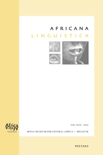
Africana Linguistica
Scope & Guideline
Charting New Territories in African Linguistics
Introduction
Aims and Scopes
- Morphological Studies:
The journal emphasizes research on morphological aspects of African languages, including phenomena such as borrowing, reduplication, and gender systems. - Typological Analysis:
It provides a platform for typological studies that compare and contrast grammatical features across different African languages, highlighting their unique characteristics and similarities. - Syntactic Structures:
Research addressing the syntactic structures, including verb marking, subject inversion, and negation, is a core area of focus, contributing to a deeper understanding of language mechanics. - Historical Linguistics:
The journal also includes studies on the historical evolution of languages, examining changes over time in tense systems and other grammatical features. - Pragmatics and Semantics:
Exploration of semantic-pragmatic aspects in African languages, such as reflexive constructions and their contextual usage, is a key aspect of its scope.
Trending and Emerging
- Generational Language Change:
Studies on generational tone change, particularly within specific language communities, indicate a growing interest in how languages evolve over time in response to social dynamics. - Morphological Borrowing:
The investigation of morphological borrowing between language families, such as Central Gur into Songhay, suggests an increasing focus on language interaction and contact phenomena. - Animacy and Gender Systems:
Research on animacy-based gender systems demonstrates an emerging interest in how these systems operate within the context of African languages, potentially influencing broader linguistic theories. - Constructions and Syntax:
An uptick in studies focusing on specific syntactic constructions, like reflexive constructions and tense systems, points to a renewed interest in understanding the intricacies of syntax in African languages. - Typological Evolution:
The exploration of typological characteristics and the evolution of language features, such as diminutives and transitivity, indicates a trend toward comprehensive typological frameworks in African linguistics.
Declining or Waning
- Fieldwork and Documentation:
There appears to be a reduction in papers focused on fieldwork and documentation of lesser-studied languages, which may reflect a shift towards more theoretical or comparative studies. - Sociolinguistic Variation:
Themes related to sociolinguistic variation and language contact have become less frequent, indicating a waning interest in the sociocultural aspects of language use. - Phonetic Studies:
Although phonetics is an important aspect of linguistics, there has been a noticeable decrease in papers specifically addressing phonetic features and their implications in African languages.
Similar Journals

SKASE Journal of Theoretical Linguistics
Connecting Scholars Through Innovative Linguistic ResearchSKASE Journal of Theoretical Linguistics, published by the SLOVAK ASSOCIATION STUDY ENGLISH-SKASE, is a distinguished Open Access journal that expands the horizons of linguistic research and theoretical frameworks. With its ISSN N/A and E-ISSN 1336-782X, the journal has established itself as a pivotal resource for scholars in the field, achieving a commendable Q2 ranking in Linguistics and Language as of 2023. The journal, which has been in continuous publication since 2017, actively publishes innovative research studies, reviews, and theoretical discussions, easing access to groundbreaking work for academics and practitioners alike. Based in Slovakia, it connects a rich heritage of linguistic scholarship and is indexed in Scopus, ranking alongside its peers in both Arts and Humanities and Social Sciences categories. The SKASE Journal of Theoretical Linguistics is crucial for anyone interested in the evolving landscapes of linguistics, serving as an invaluable platform for disseminating knowledge and fostering collaboration amongst researchers worldwide.

Mandenkan-Bulletin Semestriel d Etudes Linguistiques Mande
Charting New Territories in Mande Language StudiesMandenkan-Bulletin Semestriel d'Etudes Linguistiques Mande is an esteemed academic journal dedicated to the exploration of Mande languages and linguistics, published by the Centre National de Recherche Scientifique in France. With its ISSN 0752-5443, this journal has established itself within the linguistic community, holding a notable Q3 ranking in both the Linguistics and Language category as well as respectable standings in Scopus ranks, placing it in the 55th percentile for language and linguistics. Since its inception in 2018, it has been pivotal in publishing groundbreaking research that advances our understanding of the Mande language family and its cultural implications. Although currently not open access, the journal offers a wealth of knowledge fostered through rigorous peer-reviewed articles aimed at linguists, researchers, and students alike, making significant contributions to the fields of linguistics and African studies.

Palaeohispanica-Revista sobre Lenguas y Culturas de la Hispania Antigua
Advancing Scholarship on Ancient Languages and CulturesPalaeohispanica-Revista sobre Lenguas y Culturas de la Hispania Antigua is a distinguished academic journal dedicated to the study of ancient Spanish languages and cultures. Published by the INST FERNANDO CATOLICO in Spain, this journal serves as an essential platform for scholars and researchers exploring the rich historical and linguistic heritage of Iberia. With a specific focus on the intersections of archaeology, history, linguistics, and cultural studies, Palaeohispanica has garnered substantial recognition, reflecting its commitment to high-quality research as evidenced by its rankings in prominent Scopus categories, reaching the 80th percentile in History and the 69th in Archaeology. While the journal operates without an Open Access option, it continues to contribute significantly to the academic discourse surrounding ancient Hispania from 2019 to 2023, ensuring that vital research is accessible to a discerning audience. As a Q3 and Q2 ranked publication in various relevant categories, it is an invaluable resource for professionals, researchers, and students eager to delve into the complexities of ancient languages and cultures.
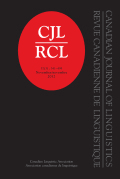
CANADIAN JOURNAL OF LINGUISTICS-REVUE CANADIENNE DE LINGUISTIQUE
Connecting researchers and ideas in the world of linguistics.The Canadian Journal of Linguistics - Revue canadienne de linguistique is a prestigious peer-reviewed publication dedicated to advancing the field of linguistics. Published by Cambridge University Press, this journal has firmly established itself as a vital resource for researchers, professionals, and students alike, offering insights into a diverse range of linguistic studies and theories. With an impressive impact factor reflecting its academic rigor, the journal is ranked Q2 in the categorization of linguistics and language as of 2023, and holds commendable positions in both Scopus ranks for Arts and Humanities as well as Social Sciences. The journal's converged years span from 1996 to 2024, showcasing a rich history of contributions to the discipline. Although it currently does not offer open access, it remains highly influential. Located in Canada, the journal plays a crucial role in fostering scholarly communication within the linguistic community, making it an essential outlet for disseminating groundbreaking research and engaging discussions.

LINGUISTIQUE
Fostering Scholarly Discourse in Language ScienceLINGUISTIQUE, an esteemed journal published by PRESSES UNIV FRANCE, serves as a vital platform for scholarly discourse in the fields of linguistics and language studies. With its ISSN 0075-966X and E-ISSN 2101-0234, this French journal has been a significant contributor to the understanding of linguistic phenomena since its inception in 2004, and it continues its journey through to 2024. Although currently categorized in the Q4 quartile for both Arts and Humanities (miscellaneous) and Linguistics and Language, its commitment to publishing quality research encourages a diverse range of articles, reviews, and innovative studies. Positioned in the 32nd and 29th percentiles for its respective fields according to Scopus rankings, LINGUISTIQUE is dedicated to advancing knowledge and stimulating engagement among researchers, professionals, and students alike. While it does not offer open access, the journal remains an essential resource for those who seek to deepen their understanding of linguistic principles in a global context, facilitating a richer discourse that connects theory with practice.
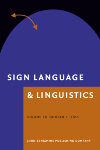
Sign Language & Linguistics
Elevating Research in Sign Language StudiesSign Language & Linguistics is an esteemed academic journal published by John Benjamins Publishing Co, dedicated to advancing the field of sign language studies and linguistics. With an ISSN of 1387-9316 and an E-ISSN of 1569-996X, this journal has earned a prominent place in the linguistic community, achieving a Q1 ranking in both the Linguistics and Language category, and standing out within the Scopus rankings, placing in the 77th percentile among the Arts and Humanities and 75th percentile in the Social Sciences categories. Sign Language & Linguistics spans over two decades of research, offering comprehensive insights and analyses from 1998 to 2024, promoting high-quality scholarly communication. Aimed at researchers, professionals, and students alike, this journal is essential for those exploring the intersection of sign languages, linguistics, and cultural studies, facilitating progressive discourse and fostering an understanding of this vital mode of human communication.

Turkic Languages
Navigating the Intricacies of Turkic Language StudiesTurkic Languages is an esteemed academic journal published by HARRASSOWITZ VERLAG, dedicated to the exploration and analysis of Turkic languages within the broader fields of linguistics and language studies. With an ISSN of 1431-4983, this journal serves as a vital platform for researchers, professionals, and students interested in the intricate structures, dynamics, and cultural contexts of Turkic languages. Although it currently operates without an Open Access option, the journal's commitment to quality research is evident in its placement within the Q4 category of Linguistics and Language for 2023, alongside its Scopus rankings where it stands in the 30th and 26th percentiles for Language and Linguistics across Arts and Humanities and Social Sciences, respectively. The journal's scope encompasses a variety of linguistic phenomena, striving to foster a deeper understanding of Turkic languages and their significance in the global linguistic landscape. With converged years from 2017 to 2022, Turkic Languages continues to uphold its reputation as a crucial resource for advancing scholarship in this specialized field.
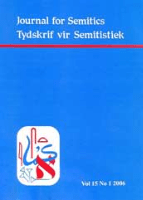
Journal for Semitics
Connecting Cultures Through Semitic Research ExcellenceJournal for Semitics
Published by UNISA PRESS, the Journal for Semitics is a pivotal platform dedicated to the interdisciplinary study of Semitic languages, literature, and cultures. With its ISSN 1013-8471, this journal provides a comprehensive forum for scholars to disseminate original research, critical reviews, and theoretical discussions that enrich our understanding of Semitic studies in a global context. Although the journal does not currently offer Open Access options, its meticulous peer-review process ensures high-quality scholarship that resonates with academic standards in the field. Flanked by a notable commitment to cultural and linguistic diversity, the Journal for Semitics is essential for researchers, professionals, and students striving to expand their knowledge and engage actively in contemporary Semitic scholarship. Located in Pretoria, South Africa, this journal encapsulates a rich academic tradition while aiming to shape future discourse in Semitic studies.
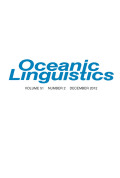
OCEANIC LINGUISTICS
Celebrating the Vibrancy of Pacific LinguisticsOCEANIC LINGUISTICS is a premier academic journal published by UNIV HAWAII PRESS, dedicated to the study of languages spoken in the Pacific region. This esteemed journal, bearing ISSN 0029-8115 and E-ISSN 1527-9421, serves as a vital platform for linguists, researchers, and scholars to disseminate significant findings and insights related to Oceania's rich linguistic diversity. With a commendable impact factor and categorized in the Q2 Quartile for the field of linguistics and language, OCEANIC LINGUISTICS ranks 335th out of 1088 in Arts and Humanities and 395th out of 1167 in Social Sciences, reflecting its relevance and influence in ongoing linguistic discourse. The journal is a subscription-based publication, committed to advancing research and fostering scholarly communication from 2004 to 2024, making it an essential resource for anyone engaged in the study of linguistic phenomena in the Oceania region and beyond.

Stellenbosch Papers in Linguistics Plus-SPiL Plus
Innovating Language Studies for a Diverse WorldStellenbosch Papers in Linguistics Plus (SPiL Plus), published by the Department of General Linguistics at the University of Stellenbosch, is a prominent open-access journal dedicated to the dissemination of research in the field of linguistics. Established in 1980, SPiL Plus provides a collaborative platform for researchers, professionals, and students worldwide, facilitating the sharing of innovative linguistics research from diverse subfields. With an ISSN of 1726-541X and an E-ISSN of 2224-3380, this journal has secured its place in the academic landscape, despite currently holding a Q4 ranking in Linguistics and Language for 2023. It's ranked 481 out of 1088 in the Scopus metrics for Arts and Humanities and stands at the 55th percentile, confirming its relevance and contribution to the linguistics discourse. The journal aims to foster scholarly exchange and address significant linguistic issues, making it an essential resource for anyone passionate about language and its complexities. Readers can access its articles freely, promoting wider accessibility and engagement with linguistic research from South Africa and beyond.